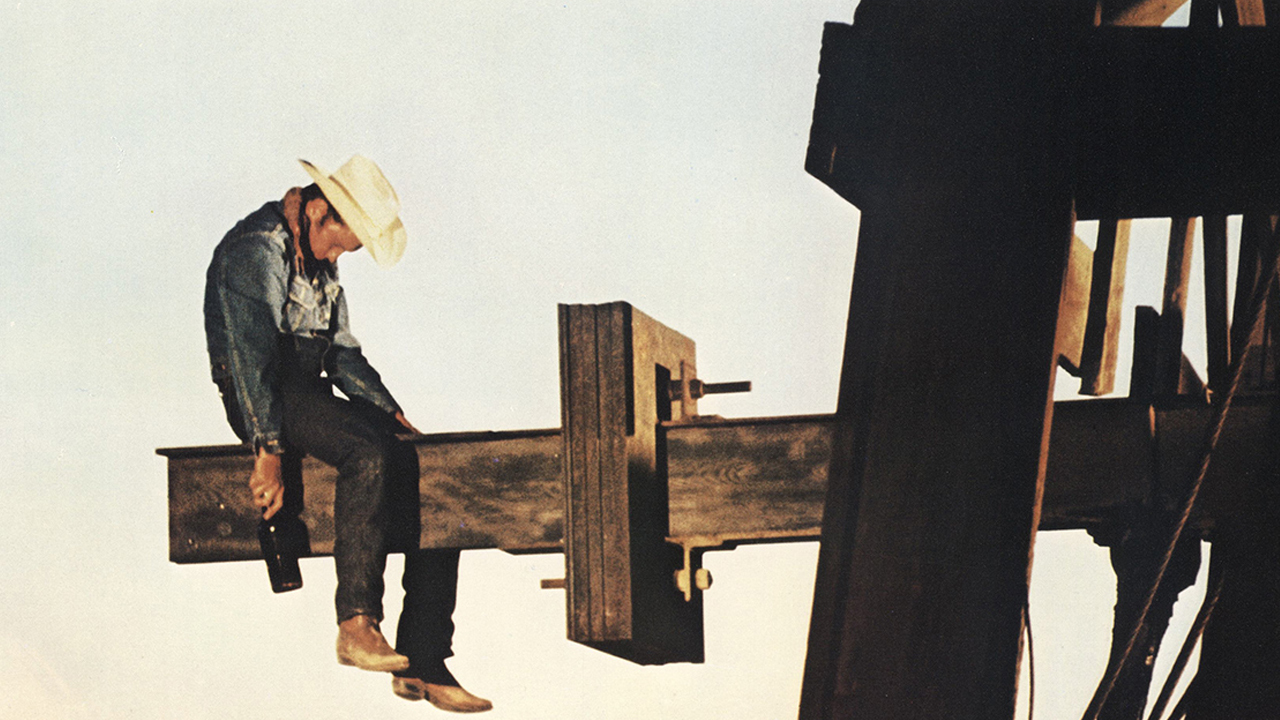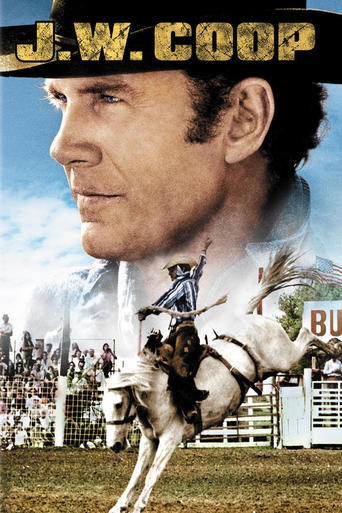

Cliff Robertson set out to make two films in J.W. Coop (he worked on the screenplay as well as directed and starred), but in this case his effort winds up as only half a good movie.He starts with an interesting premise -- a former rodeo cowboy emerges from prison c.1970, tries to pick up where he left off, and finds that both society and the rodeo game have moved on. The first half of the film is pretty good, dealing with J.W.'s efforts to adjust to his senile mama (Geraldine Page) and to a society where "the kids, the commies, and the unions" (so says one character) are ruining the country.But when J.W. actually starts rodeoing, the picture shifts to an underdog-making-good-in-a-cutthroat-world scenario, as the old cowboy becomes an unlikely dark-horse contender for the national rodeo championship (competing against a younger rider with more corporate savvy). The ending of the film is unsatisfying and leaves us feeling incomplete -- there's more story to be told, but Robertson leaves us to feel sorry for a guy who, frankly, is not beaten down so much by "the establishment" as by his own pride.Also unsatisfying is Page's role in the film. She appears in one scene toward the beginning of the movie, and then she disappears. Maybe that's reality, but art provides the opportunity to inject more of her story and her relationship with J.W. into the film. That opportunity is missed. We do learn some more about J.W.'s family as the film progresses, but there's no closure on his mom-and-pop issues, although I suppose one could argue that the lack of parental comfort has something to do with the end of the movie.Robertson the actor is pretty darned good in this film, capturing J.W.'s initial bewilderment, suspicion and frustration with the '70s, and later his delight at having gained the love of a younger woman (Christina Ferrare). And Robertson the director has a nice eye for small towns and "the sticks" (there's a scene at a rural crossroads that's beautifully shot). But he's undercut by Robertson the screenwriter -- it's just difficult to buy J.W. as a contender for a major championship right out of prison (even if he has been rodeoing successfully there). And the film bites off more than it can chew in trying to comment both on social change and the rodeo life. This could have been a far stronger movie if it concentrated on one or the other -- and, to be honest, the encounter of a '50s guy with the early '70s was the far more interesting part of the film.
... View MoreActor Cliff Robertson’s clout after his Oscar win in CHARLY (1968) allowed this personal venture which he wrote, produced and directed as well as starred in; the film, though much admired in some circles and certainly well-made, is essentially dreary and somewhat overlong for its purpose. Incidentally, rodeo is not a subject which has been treated often by Hollywood: a couple more notable efforts were Nicholas Ray’s rare but highly regarded THE LUSTY MEN (1952) – which I recently acquired but have yet to watch – and Sam Peckinpah’s contemporaneous and better-known JUNIOR BONNER (1972).Anyway, the titular figure is an enthusiast of the sport who wants to pick up where he left off following a 10-year stint in jail for fraud; after a pathetic reunion with his senile mother (a cameo, despite her second billing, by a disheveled Geraldine Page), he sets off to seek a prominent spot in the National Finals. This entails a series of contests across the country – he starts off by hitching rides to each destination, then borrows a van (through a friend) from a military base but, after scoring a number of successes and winning a pile of money, he can afford to fly the rest of the way.Robertson meets spirited young hippie Cristina Ferrare; following the initial distrust (being a middle-aged uneducated cowboy himself, they have virtually nothing in common), he comes to appreciate her devoted presence by his side – however, when he finally proposes marriage, she quits him. Coop’s biggest rival is a brash stud half his age whose wealth is able to keep him well ahead of the game (getting to the various rodeo venues by way of a private plane). Still, our hero perseveres – but his dream seems to come to an end when he breaks a leg; undaunted, he decides to mount a particularly wild bull…but his triumph this time around is short-lived and he’s gored by the testy animal! Robertson elicits fine performances all around and shows great feeling for small-town America – as well as passion for his central theme (which isn’t so much about achieving one’s goals no matter what, as how this often rings hollow when all one has to show for it is loneliness). A nice folksy score supplies the perfect accompaniment to the film’s attractive photography – offsetting the generally downbeat tone and the occasional instance of self-conscious direction (such as the use of abrupt zooms or Coop’s slow-motion last ride). Equally agreeable are its sparse moments of humor – namely the cowboy’s ironic home address, 1313 Luck Road, requested by an apologetic cop when he’s forced to give him a ticket (Coop’s driving his late father’s ‘smoking’ broken-down car) and the incident in the diner’s lavatory where rednecks attack the hero’s black pal but, even outnumbered, they beat up their assailants and, when the cops arrive, Robertson justifies the mess by claiming the locals had been making “weird advances”!
... View Morejust reading the blurb and knowing that Cliff Robertson was a part of the film was enough for me to know that this was going to be a gem [although Robertson has made some horrible movies]. I got a pal of mine at work to run me a copy iny], and it surpassed my expectations. This film increased my resolve to attend rodeo school. Because it was something I always wanted and at forty-one years of age and never having ridden a horse I gave my wife and daughter a kiss and piled in my car for Georgia and the time of my life. Why rodeo? In the words of the author of RODEO: the Suicide Circuit, because it is the last place in these hard times where a man with nothing can meet it head on on his own *#*# terms and maybe do something. JW Coop conveys this perfectly. But this movie is not simply about rodeo. Like the film, the SAND PEBBLES, a man is trying to translate his existence into something meaningful. It is about a nobody going after the only thing in his life that makes sense. Just writing about it gets my blood up.Some would disagree with the ending, but I can see it no other way. If you want to see a movie about a man going after life this is one film sure to satisfy. I give JW COOP a three star [out of four] and it stands as one of my favorites.
... View MoreExcellent story about a cowpoke who wants to be the number one rider in the nation. He worked hard at it, and made his name well known on the circuit, even getting to the point of acquiring his own airplane. A good look at the rodeo from behind the scenes. Near the end was a very graphic scene of a cowboy caught up in the harness of a raging bull. I heard it was not a setup take, but was real footage from a rodeo. I know it made me cringe to watch it. 4 stars.
... View More